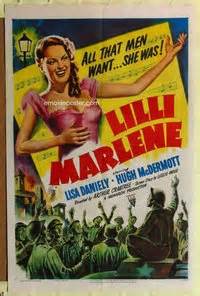Plot
A French girl named Lilli Marlene, working in her uncle's café in Benghazi, Libya, turns out to be the girl that the popular German wartime song Lili Marleen had been written for before the war, so both the British and the Germans try to use her for propaganda purposes – especially as it turns out that she can sing as well. The Germans try to snatch her at one point, but don't succeed, and she performs several times for the British troops and also appears in radio broadcasts to the US, arranged by Steve, an American war correspondent embedded with the British Eighth Army, who eventually becomes her boyfriend.
Later, the Germans successfully kidnap her in Cairo and she is taken to Berlin, where she is interrogated and repeatedly told that she had been tortured and brainwashed by the British to think that she was French, when she actually is German. Once the Germans think that she has been transformed into a loyal Nazi, they set her to make broadcasts in English for the Third Reich. Her old British friends, and especially Steve, are very disappointed in her.
After the war, she reappears in London during a big reunion for members of the Eighth Army. She manages to convince Steve and a few of her other Eighth Army friends that she never betrayed the British; however, British security agents try to arrest her. Steve and another old friend, Berry, take off with her in their broadcasting van, chased by the security people. They drive to an address in London that she had been given by the German colonel in charge of her broadcasts, in case she ever went to London and was in need of help. When they get there, she finds that the German colonel lives in it. It turns out that he is actually a British intelligence officer who was working undercover in Berlin during the war. He informs them and the security people that Lilli was never a traitor, and that, in all her communications, there were encoded messages to the British intelligence services back in London.
Once they know the truth, Steve and Berry take her back to the reunion, where everybody is told that Lilli never was a traitor. She sings the Lili Marleen song for all of them and afterwards she and Steve kiss.
Reception
The film was a hit at the British box office, being judged by Kinematograph Weekly as a "notable performer" at British cinemas in 1951. [6]
The Monthly Film Bulletin wrote: "The film steers its way unevenly through a variety of implausible situations, but with the title song persuasively sung by Lisa Daniely and liberal doses of army humour, makes agreeable enough entertainment." [7]
In British Sound Films: The Studio Years 1928–1959 David Quinlan rated the film as "average", writing: "Winds its way agreeable through a series of rather implausible situations." [8]
This page is based on this
Wikipedia article Text is available under the
CC BY-SA 4.0 license; additional terms may apply.
Images, videos and audio are available under their respective licenses.
